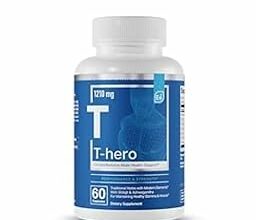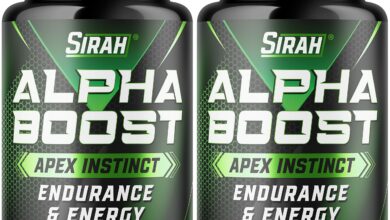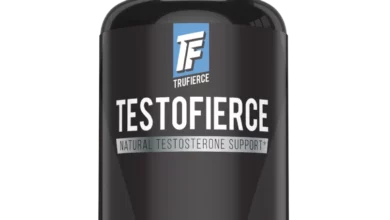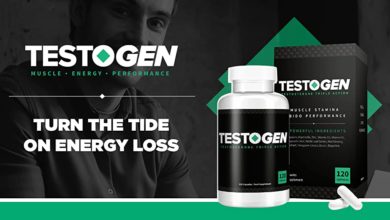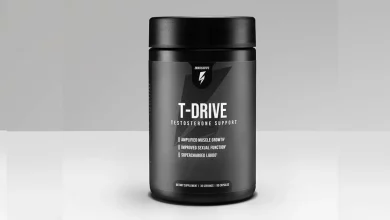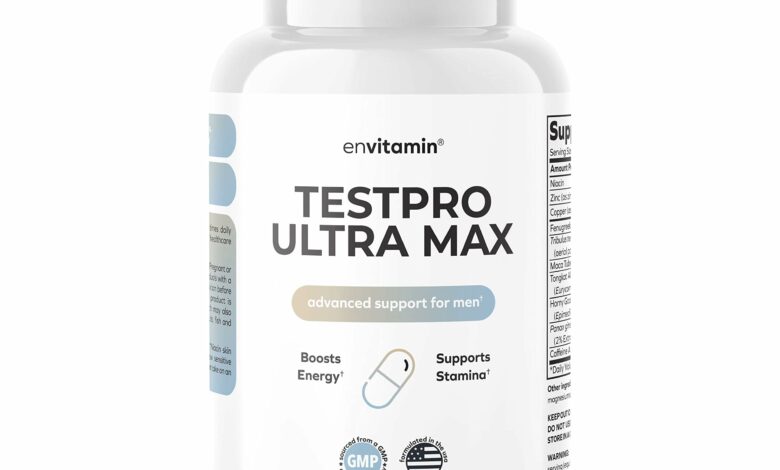
Testpro Ultra Max Reviews
When it comes to what motivates you as a man, there’s likely a lot of answers that come to mind. Physiologically however, there’s one thing at the top of that list, and that’s testosterone. Studies have found that men with low testosterone levels experience low self esteem and even lower energy levels than peers with healthy testosterone levels. That’s not to mention athletes, all of which have very high levels of testosterone, showing the numerous health benefits that comes with high testosterone, such as it’s ability to increase energy, improve physical performance, improve mental clarity, and even an increased sexual performance due to healthy testosterone levels having a reduced risk of erectile dysfunction thanks to improved blood flow.
It’s a shame then that it’s been found that following the age of 25, testosterone production decreases, leaving many of us looking for solutions. That’s where testosterone supplements come into play, as they gather ingredients with clinical data supporting their ability to improve testosterone production, or at least that’s what they claim.
That leads us to the main question of todays article: Does Ultramax testo enhancer work? The short answer is… a little bit? There’s some good ingredients here, and it’s certainly a reasonable price, but we can’t ignore the fact that whatever ultramax testo enhancer benefits you might experience will be outclassed in every way by it’s contemporaries. That’s why instead we recommend you check out our personal favourite testosterone booster TestoFuel. You’ll recognise some shared ingredients between the too, as we said testpro ultramax isn’t the worst, but in testofuel these ingredients are dosed much higher, as well as being placed in a formula with similarly effective and synergistic ingredients, all in all providing you with a much more reliable solution to your testosterone woes.
Lets take a closer look at what makes up testpro.
Testpro Ultra Max Ingredients Breakdown
Niacin – 10mg
Also known as Vitamin B3, Niacin is one of the lesser spoken bout B vitamins. As is standard with B vitamins, Niacin plays a highly important role in our metabolism, being responsible for over 400 enzyme reactions within the body. The reason it’s brought up a lot less in nutritional conversations is simply because it’s so abundant that the majority of us get more than enough in our daily lives without much effort at all, and ofcourse this also means deficiency is exceedingly rare [1].
When it comes to testosterone levels, there’s not been much research done, but what’s been found is largely positive effects with a significant increase of testosterone being observed. There are some caveats to this however, as firstly this was a study performed on rats, and though this provides evidence that it may have a similar effectiveness on humans, it’s far from conclusive. Secondly is the dosage, at 50mg/kg. If we take these numbers and scale them up to the average person, you would requite 4000mg of Niacin in order to repeat the experiment. 10mg is a
Zinc – 7.5mg
This essential element is found is plenty of foods, and yet zinc deficiency is an issue throughout the world, including the USA with an estimated deficiency rate of 12%. Groups who are high risk include vegetarians, vegans, people with alcohol use syndrome, and people with gastrointestinal disorders such as inflammatory bowel disease [3].
Men who fit within these categories should seriously consider supplementing Zinc, as low levels are associated with hypogonadism, which in layman’s terms means less testosterone. This can be seen in clinical trials, such as one we found where they restricted zinc in mens diets and to record and compare testosterone levels with zinc levels. They found a severe decrease, as well as an increase after supplementation was implemented. The researchers concluded that Zinc plays a role in modulating testosterone levels in men [4].
Copper – 1mg
Most of us only think about copper as a hard metal that typically represents lower value currency, even though this is a largely outdated practice. Similar to iron, it’s also an essential mineral and important part of a healthy diet. It plays important roles in our bodies that extends to brain development and immune functioning, and potentially even testosterone production [5].
There is an issue however, and that’s that it’s actually been observed to have an inverse effect on testosterone levels. We found a meta-analysis that compiled data on trace elements including zinc, selenium and copper and the associations between them and sex hormones. All data on copper points to a reduction in testosterone levels, likely caused by increased levels of sex hormone binding globulin (SHBG) [6], leading us to question it’s inclusion in a testosterone boosting supplement.
Fenugreek Seed 50% Extract – 300mg
If you’ve researched testosterone boosters before then you’ve likely encountered this common natural supplement. It’s in pretty much any decent male enhancement supplement thanks to it being one of the most well understood natural testosterone boosters out there. Remember how Coppers boosts SHBG, limiting testosterone activity in the body? Fenugreek basically does the opposite, directly reducing the amount of SHBG in the bloodstream and therefore having a significant impact on testosterone levels.
There’s plenty of clinical data to back this up, such as a systematic review we found containing four individual trials from 2020, in which the researchers confidently asserted “Fenugreek Extract has a significant effect on total serum testosterone [7].
Tribulus Terrestris 40% Extract – 60mg
A member of the buttercup family, can this supplement do more than tell if you like butter? Well some evidence does suggest it can, whereas some says otherwise. For example, we found a great study that looked at many different possible applications of the natural supplement, checking it’s effects on Body mass, fat mass, fat composition, testosterone, cortisol, and CrossFit performance both before and after intervention. the found no significant difference except for bench press performance and overall testosterone levels, suggesting it could have improved testosterone production but was otherwise inconclusive on the matter [8]. This trial tested with 770mg, so quite a bit more that Testpro have included.
Maca Tuber Powder – 50mg
Maca Root is another highly popular natural ingredient for many choice testosterone supplements, and when looking at it’s historical use the pieces certainly align. Maca Root was considered able to improve mental clarity, overall health and promote a healthy mood, with many claiming it also had aphrodisiac effects.
The clinical literature backs this up, such as a study we found analysing these effects over a 12 week period. Alongside asking for self-perception of sexual desire, the patients had their testosterone levels measured. When compared against placebo, after 8 weeks of treatment those receiving maca had a significant increase to sexual desire, which interestingly did not coincide with any increase to testosterone levels [9]. That said, the dosage is important to note here, as these results were achieved at 1,500mg and 3,000mg. It’s common for brands to opt to use concentrated doses because of this, but this doesn’t appear to be the case for Testpro ultra max.
Tangkat Ali Powder – 25mg
Originating from Malaysia, this herbal medicine is most traditionally boiled and used as an antibiotic, appetite stimulant, and aphrodisiac. It’s this last use case we’re most interested in ofcourse, and the way it functions is quite different to most ingredients you’ll find in testosterone boosters, but just as effective.
In order to understand how this works, you first need to understand the relationship between the stress hormone cortisol and testosterone. Essentially what happens is when cortisol levels go up, testosterone levels drop, and the reverse effect can be seen too [10]. This is one of the many reasons why exercise can do wonders for your stress levels.
Tangkat Ali has been clinically observed to have a direct impact on stress hormones, lowering their presence in the body. One such study took 63 subjects and provided them a traditional hot-water extract of Tongkat Ali as well as having a placebo group, and found cortisol had reduced by an average of 16%, and testosterone had increased by an average of 37% [11].
Dosing is another detrimental factor here however, as hot-water extract (essentially making a tea) isn’t especially clear about how much of the active compounds are being ingested. Powder extract is, however, and in order to replicate these results, other studies have had to use 400mg powder, leaving this 25mg to seem ineffective [12].
Panax Ginseng Root – 27.85mg
Panax Ginseng, also known as Korean red ginseng or more recently “the King of all herbs”, has been used as a herbal treatment to increase energy levels and sexual dysfunction. It’s long been thought of as an aphrodisiac, and the clinical evidence seconds this, with confirmation from both animal and human trials that supplementation of ginseng increases libido.
Human trials have found that Ginseng does a lot more than just help with libido however, as ginseng has also been found to improve fertility and sperm quality in both healthy subjects and those with previously known fertility issues [13].
All of this has led ginseng to be a popular ingredient in many things, from energy drinks to nootropics and, ofcourse, testosterone boosters, but as has become a common occurrence at this point the dosing leaves a lot to be desired. Observable effects in clinical trials are seen at 100mg or above.
Caffeine Anhydrous – 25mg
The most commonly used psychoactive drug in the world, caffeine is hard to avoid. Whether it’s the 5th coffee shop you pass on your way to work or your preferred soda, it’s everywhere. Now we’re all aware that it can increase energy and focus, but caffeine has many physiological effects that are lesser known. One example is how it influences the intensity of training, with patients pushing harder and longer after ingesting caffeine without any prompt from researchers [15].
In terms of testosterone, caffeine has been observed to help with a small increase of 15%. This is all well and good, but unfortunately there’s a catch as it also increased cortisol by 52%, and as we discussed, this prevents the body from responding to testosterone [16].
Verdict – A Decent Formula Overshadowed by it’s Peers
So there’s testpro ultra max, and as you can see there’s definitely some good stuff here, and for it’s price range it’s actually a pretty good product all in all. The issue comes from comparing it to the other options in the market, where you start to see the shortcomings in dosing/ ingredients choice aren’t something you need to put up with. It may cost you a little bit more, but it’s a false economy. Are you going to be happier spending $20 on something that doesn’t work or $40 on something that does?
This is why if you’re interested in testosterone boosters, we highly recommend you check out Testofuel. There’s shared ingredients but the difference is that in Testofuel, they’re actually dosed correctly, with 1,800mg of Maca Root and 800mg of Fenugreek. They also include clinically proven ingredients such as Boron and Oyster Extract, but don’t just take our word for it. Check out the link below to see for yourself.
References
1 – https://ods.od.nih.gov/factsheets/Niacin-HealthProfessional/
2 – https://www.ncbi.nlm.nih.gov/pmc/articles/PMC10433454
3 – https://hlthmagazine.com/blogs/info/does-zinc-increase-testosterone
4 – https://pubmed.ncbi.nlm.nih.gov/8875519/
5 – https://ods.od.nih.gov/factsheets/Copper-HealthProfessional/
6 – https://www.ncbi.nlm.nih.gov/pmc/articles/PMC9511025/
7 – https://pubmed.ncbi.nlm.nih.gov/32048383/
8 – https://www.ncbi.nlm.nih.gov/pmc/articles/PMC4120469/
9 – https://pubmed.ncbi.nlm.nih.gov/12472620/
10 – https://www.ncbi.nlm.nih.gov/pmc/articles/PMC3880087/
11 – https://www.ncbi.nlm.nih.gov/pmc/articles/PMC3669033/
12 – https://pubmed.ncbi.nlm.nih.gov/23754792/
13 – https://www.ncbi.nlm.nih.gov/pmc/articles/PMC3861174/
14 – https://www.ncbi.nlm.nih.gov/pmc/articles/PMC8400708/
